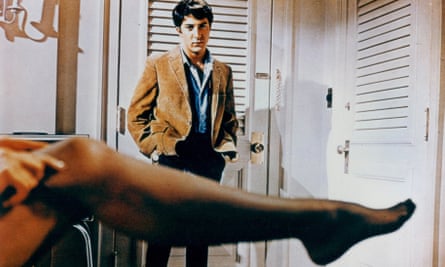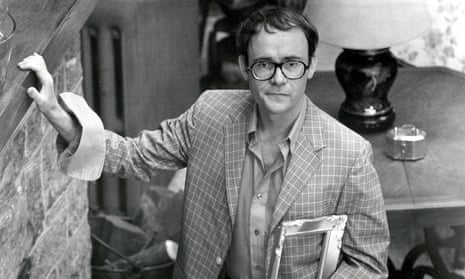The actor and screenwriter Buck Henry, who has died aged 89 of a heart attack, was rarely seen without a baseball cap and a deadpan expression; he looked like Jack Lemmon gone sour.
One of the architects of modern American comedy, Henry created with Mel Brooks the TV spy spoof Get Smart, which ran on US television from 1965 to 1970, received an Oscar nomination for The Graduate (1967), co-wrote the screwball masterpiece What’s Up, Doc? (1972), which was his favourite among his own work, and performed regularly during the 1970s on the US sketch series Saturday Night Live. He later wrote Gus Van Sant’s black comedy To Die For (1995), starring Nicole Kidman as a rapacious TV weather forecaster who plots her husband’s murder.
It was The Graduate that established Henry as a gifted talent with sly satirical leanings and a quizzical sensibility. He was the fourth writer to be brought in by the producer Lawrence Turman and the director Mike Nichols to adapt Charles Webb’s 1963 novella, and the first to find in the title character, Benjamin, an appealing vulnerability.
The newcomer Dustin Hoffman played the aimless young Californian who drifts into an affair with the older, married Mrs Robinson (Anne Bancroft) even as he is confused and repulsed by the adult world. Along with Bonnie and Clyde (also 1967), which Henry had briefly been in the running to write when Jean-Luc Godard was slated to direct it, The Graduate was the catalyst for a new wave of adventurous US film-making.
Henry was annoyed, however, to find himself sharing the screenplay credit with one of the previous writers, Calder Willingham. (“Everyone knew Buck wrote the script,” Turman pointed out.) He also expressed bewilderment over how the film was received. “I never thought of The Graduate necessarily as a comedy. I thought of it as a love story that had comedy things about it.”

He was born in New York to Peter Zuckerman, a stockbroker and US Air Force pilot, and the actor Ruth Taylor, who had more than 40 film credits including the lead in the original Gentlemen Prefer Blondes (1928); she gave up acting soon after giving birth to him.
As a child, Henry mixed with his parents’ celebrity friends, including Howard Hughes, Humphrey Bogart, Lauren Bacall and Peter Lorre, but he was especially fascinated by the Hollywood comedy writers of their acquaintance: “No audience knew who they were, but everyone heard their jokes on their favourite shows.”
He was educated at the Choate school in Dartford, Connecticut, and at Dartmouth College, New Hampshire, where he wrote stories for the Dartmouth Quarterly and ran with the theatre crowd. He enlisted in the military during the Korean war and toured army bases performing in a revue that he had also written and directed. Upon returning to New York, he did a variety of jobs, including dubbing foreign films for the US market. He was also the figurehead of a hoax perpetrated by his friend Alan Abel, appearing on TV chat shows as the supposed president of a campaign to preserve the decency of animals by keeping them clothed; “A nude horse is a rude horse,” ran one of his slogans.
In 1962, he joined the improv troupe The Premise and worked on TV comedies such as the US version of That Was the Week That Was and The Garry Moore Show, where he wrote for a cast that included Carol Burnett. His first film script, co-written with Theodore Flicker, was The Troublemaker (1964), about a man who becomes embroiled in comic confusion and corruption when he tries to open a coffee house.
In the wake of Get Smart and The Graduate, Henry was greatly in demand. He adapted Terry Southern and Mason Hoffenberg’s novel Candy (1968), derived from Candide and featuring eccentric turns from Marlon Brando, Charles Aznavour and Ringo Starr, and turned Bill Manhoff’s play The Owl and the Pussycat into a vehicle for Barbra Streisand.
He scripted two further adaptations for Nichols: an ambitious film of Joseph Heller’s antiwar satire Catch-22 (also 1970), which repeated the dazed, sceptical tone of The Graduate though not its commercial success, and the 1973 thriller The Day of the Dolphin (“I thought it was a stupid book. I tried to move it in the direction of a less stupid film.”) With Warren Beatty, he co-directed and acted in Heaven Can Wait (1978), a remake of the 1941 reincarnation comedy Here Comes Mr Jordan. His only solo directing gig was the presidential comedy First Family (1980) which had a top-notch cast (Bob Newhart, Gilda Radner, Madeline Kahn) but flopped nonetheless.
Henry usually turned up on screen in the films he wrote; he can be seen in The Graduate, for instance, as the quietly intimidating desk clerk at the hotel where Benjamin and Mrs Robinson are having an assignation. But his acting career was diverse, and quite distinct from his screenwriting one.
He is impressive as a middle-class parent who joins the counter-culture after his daughter goes missing in Miloš Forman’s delightful Taking Off (1971). He played a patent attorney going into business with an alien (David Bowie) in Nicolas Roeg’s 1976 The Man Who Fell to Earth. (“Never quite understood the script,” said Henry in 2010. “Still don’t.”) He was in John Cassavetes’s thriller Gloria (1980) and the cannibalism comedy Eating Raoul (1982), and he appeared as himself in Robert Altman’s star-studded Hollywood satire The Player (1992), where he is shown pitching a sequel to The Graduate. For the same director, he played one of a group of friends who stumble upon a corpse during a fishing trip in Short Cuts (1993). In 1999, he joined his friend George Segal in the fourth Broadway cast of Yasmina Reza’s Art. “You can depend on him to be unsentimental all the time,” said Segal. “He’s never going to get gooey on you.”
More recently, Tina Fey cast him in several episodes of her sitcom 30 Rock as Dick Lemon, the father of Fey’s character, Liz. In one episode, it is revealed that Dick served at Pearl Harbor, but only during the Korean war; in another he gets sloshed in a bar and accidentally propositions Liz.
In 2008 he married Irene Ramp, and she survives him, as does a daughter from an earlier relationship.

Comments (…)
Sign in or create your Guardian account to join the discussion